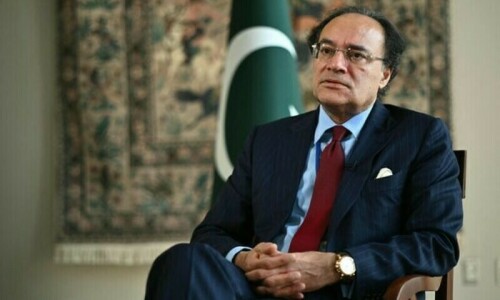It has been four years since the draconian Prevention of Electronic Crimes Act (Peca) was passed, but confusion still reigns in the country over how to deal with harmful content on social media.
On Feb 15, the Asia Internet Coalition (AIC) — a group of internet companies, including giants such as Facebook, Twitter and Google — wrote a letter to Prime Minister Imran Khan, warning him that new rules to regulate social media activity would make it “extremely difficult” for digital companies to operate in Pakistan.
Amid criticism, Prime Minister Khan said “all stakeholders” would be taken on board before implementing the new rules. Without delving into details of the process, he hoped that all internet companies would continue to work in Pakistan and that the government would address their grievances.
Uncertainty persists because some officials maintain the new rules were “approved” by the federal cabinet on Jan 28, but not notified. Sources said the rules were not being implemented right now and the upcoming consultation would be focused on overall content management and ways to generate revenue.
According to PM’s Focal Person on Digital Media Arslan Khalid, a working document on the consultation will be drafted by the Pakistan Telecommunication Authority (PTA) and will be made available to the public soon. The PTA says modalities regarding the process will be shared once finalised.
Mr Khalid said the stakeholders, including technology firms, civil society activists, parliamentarians, lawyers and media persons, would be consulted on regulating content relating to blasphemy, child pornography, extremism, hate speech, character assassination and fake news.
Inviting firms to Pakistan
Under the new rules, the internet firms are required to establish permanent offices in the federal capital.
About the government’s move, Science and Technology Minister Fawad Chaudhry said that “it is an economic decision which will increase advertising revenue”.
However, in a recent interview with Dawn, head of the PM’s Digital Pakistan initiative Tania Aidrus said the country was not ready to invite global platforms.
“Global firms, including Facebook and Google, have a defined mechanism that decides requirements to enter a country. They are incredibly cautious as they should be,” she had said, adding that the aim was to offer “comfort, legal framework, security and policy before expecting these companies to work in Pakistan”.
A glance at the digital landscape reflects the same. Just over a third of Pakistan’s population or around 76 million people are online in 2020 (17pc growth from 2019). Of the total internet users, only 37m are active social media users.
According to the 2020 digital report by We Are Social and Hootsuite, out of the total users the number of people who can be reached with advertising on Facebook is 33m, 6.4m for Instagram and 1.83m for Twitter.
If the government is serious about attracting investment, it should demonstrate commitment towards improving the investment climate, which includes financial inclusion, supporting physical and regulatory infrastructure, lowering cost of starting a business, trading across borders, fast tracking of business transactions and resolving commercial disputes.
Although Pakistan has improved its global ease of doing business ranking to 108 for 2020, it is still behind other emerging markets. Pakistan’s investment level for instance is almost half the volume attracted by growing economies like Vietnam, India, Bangladesh and Sri Lanka.
There are 17pc Pakistanis who have accounts with financial institutions (but only 1pc of the citizens have credit cards) as opposed to 80pc financial inclusion in India and 41pc in Bangladesh. Pakistan spent $856m on digital advertising in 2019 as compared to India’s $6.62bn, according to the digital report.
Besides, there is already an ongoing global movement to tax tech giants that supply services over internet to their citizens. A framework, released by the Organisation for Economic Cooperation and Development (OECD), would allow countries to tax large multinationals even if they did not operate inside their borders.
Under the negotiations, involving over 135 countries, including Pakistan, companies will pay taxes — largely based on where their sales occur. The OECD hopes to reach a consensus-based solution with all member countries by the end of this year.
Objectionable content
Under various provisions of Peca, the “priority” categories highlighted by the government (with the exception of fake news) are deemed unlawful. In fact, the PTA has reported content to social media companies under those provisions that are related to blasphemy, sectarianism, hate speech, anti-state activity, defamation and impersonation.
The government’s concern is that platforms are mostly entertaining the requests in accordance with their own community guidelines — although those guidelines overlap with most specified categories such as child pornography and extremism.
Take Facebook’s example. According to the PTA, the authority has reported a total of 14,296 URLs to Facebook, out of which the platform has removed 12,226 (6,535 for violation of its own community standards).
The problem, according to PTA, lies with regulating defamatory and blasphemous content that is reported in high volumes by both the public and over 30 stakeholders that can report content for removal/blocking.
“Through the e-portal, the Ministry of Religious Affairs alone has so far reported 24,725 links containing blasphemous, pornographic and sectarian material,” the PTA told Dawn.
Another popular concern is protecting women, children and minorities online. For authorities investigating and pursuing these cases offline, the reality is different.
According to digital rights advocacy group Bolo Bhi’s data, as of Aug 2019, 54 cases under Peca were pending in Karachi. These cases include charges under Section 21 (offences against modesty of a natural person and minority) and Section 20 (offences against dignity of a natural person). In terms of breakdown, seven accused in the cases are in jail custody, 34 are on bail, eight accused have been acquitted while there has been only one conviction. In two cases, the accused have absconded.
The new rules are meant to streamline online regulation not amplify it. Unless the government is headed on the same path as its predecessor that approved Peca, the consultation is a chance to set things right.
Published in Dawn, February 22nd, 2020














































